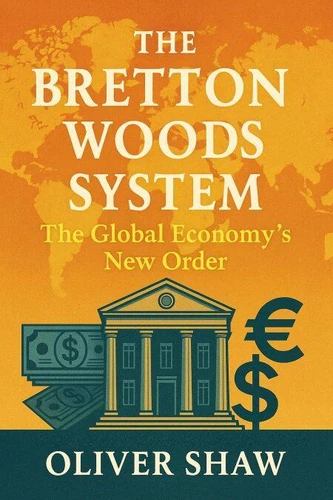The Bretton Woods System: The Global Economy's New Order
Par :Formats :
Disponible dans votre compte client Decitre ou Furet du Nord dès validation de votre commande. Le format ePub est :
- Compatible avec une lecture sur My Vivlio (smartphone, tablette, ordinateur)
- Compatible avec une lecture sur liseuses Vivlio
- Pour les liseuses autres que Vivlio, vous devez utiliser le logiciel Adobe Digital Edition. Non compatible avec la lecture sur les liseuses Kindle, Remarkable et Sony
 , qui est-ce ?
, qui est-ce ?Notre partenaire de plateforme de lecture numérique où vous retrouverez l'ensemble de vos ebooks gratuitement
Pour en savoir plus sur nos ebooks, consultez notre aide en ligne ici
- FormatePub
- ISBN8230473985
- EAN9798230473985
- Date de parution19/04/2025
- Protection num.pas de protection
- Infos supplémentairesepub
- ÉditeurIndependently Published
Résumé
The Bretton Woods System: The Global Economy's New Order by Oliver Shaw offers a comprehensive examination of the Bretton Woods system, a pivotal framework in shaping the global economic order post-World War II. The book traces the origins and establishment of the system, highlighting the influence of key figures such as John Maynard Keynes and Harry Dexter White in designing the IMF, World Bank, and the structure of fixed exchange rates.
Shaw delves into how the Bretton Woods institutions aimed to promote global stability, rebuild war-torn economies, and prevent future economic crises. The narrative explores the evolution of the system, its successes and failures, particularly in the wake of the 1971 Nixon Shock and the subsequent shift to floating exchange rates. Through detailed historical analysis, Shaw examines the challenges and opportunities the system presented for both developed and developing nations, offering a critical perspective on the global economic governance that emerged.
The book provides a fresh interpretation of Bretton Woods' legacy, its lasting impact on global finance, and the ongoing debates about the need for reform in today's multipolar economic landscape.
Shaw delves into how the Bretton Woods institutions aimed to promote global stability, rebuild war-torn economies, and prevent future economic crises. The narrative explores the evolution of the system, its successes and failures, particularly in the wake of the 1971 Nixon Shock and the subsequent shift to floating exchange rates. Through detailed historical analysis, Shaw examines the challenges and opportunities the system presented for both developed and developing nations, offering a critical perspective on the global economic governance that emerged.
The book provides a fresh interpretation of Bretton Woods' legacy, its lasting impact on global finance, and the ongoing debates about the need for reform in today's multipolar economic landscape.
The Bretton Woods System: The Global Economy's New Order by Oliver Shaw offers a comprehensive examination of the Bretton Woods system, a pivotal framework in shaping the global economic order post-World War II. The book traces the origins and establishment of the system, highlighting the influence of key figures such as John Maynard Keynes and Harry Dexter White in designing the IMF, World Bank, and the structure of fixed exchange rates.
Shaw delves into how the Bretton Woods institutions aimed to promote global stability, rebuild war-torn economies, and prevent future economic crises. The narrative explores the evolution of the system, its successes and failures, particularly in the wake of the 1971 Nixon Shock and the subsequent shift to floating exchange rates. Through detailed historical analysis, Shaw examines the challenges and opportunities the system presented for both developed and developing nations, offering a critical perspective on the global economic governance that emerged.
The book provides a fresh interpretation of Bretton Woods' legacy, its lasting impact on global finance, and the ongoing debates about the need for reform in today's multipolar economic landscape.
Shaw delves into how the Bretton Woods institutions aimed to promote global stability, rebuild war-torn economies, and prevent future economic crises. The narrative explores the evolution of the system, its successes and failures, particularly in the wake of the 1971 Nixon Shock and the subsequent shift to floating exchange rates. Through detailed historical analysis, Shaw examines the challenges and opportunities the system presented for both developed and developing nations, offering a critical perspective on the global economic governance that emerged.
The book provides a fresh interpretation of Bretton Woods' legacy, its lasting impact on global finance, and the ongoing debates about the need for reform in today's multipolar economic landscape.






















